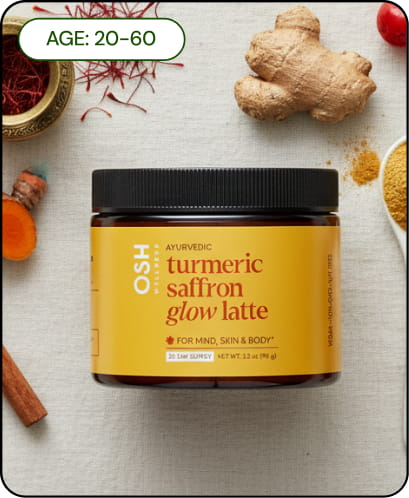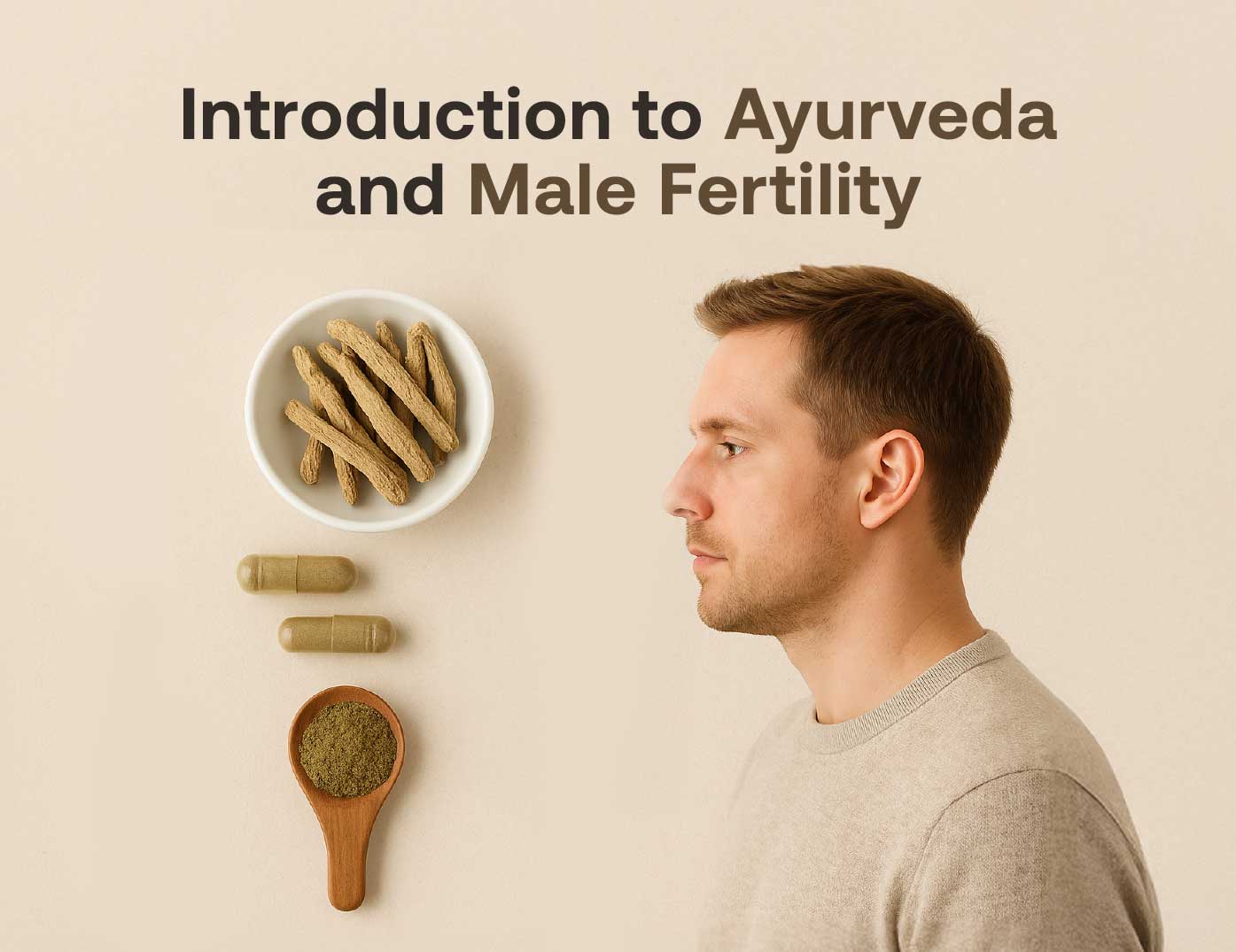Table of contents
In recent years, there has been a growing focus on male fertility and reproductive health, particularly among men aged 30+. As stress levels and environmental issues rise, many are turning to traditional approaches, such as Ayurveda, for natural solutions to these challenges. This article explores the best Ayurvedic herbs known to enhance sperm count and motility, including Ashwagandha, Gokshura, and Shilajit. We examine how these time-tested remedies integrate with contemporary scientific findings to support male fertility effectively.
Introduction to Ayurveda and Male Fertility

Ayurveda, a time-honored holistic healing system originating from India, offers insightful strategies for improving male fertility. Central to this approach is the concept of Shukra Dhatu, the reproductive tissue responsible for sperm production and vitality. Maintaining a harmonious balance among the three doshas, Vata, Pitta, and Kapha, is considered essential. Balanced Vata improves sperm motility, Pitta regulates hormonal health, and Kapha nourishes reproductive tissues [1].
Modern issues like environmental toxins, poor lifestyle choices, and chronic stress adversely impact male fertility. Ayurveda addresses these challenges through detoxification techniques like Panchakarma, optimized nutrition, and stress reduction therapies [2]. Herbs such as Ashwagandha (for managing stress and hormone levels) and Shilajit (for enhancing testosterone) are widely recognized in both traditional and modern contexts [3].
This integration of ancient knowledge with contemporary science reveals that Ayurveda offers natural, cost-effective therapies that can significantly support contemporary male fertility treatments [4].
Ayurvedic Foundations and Male Reproductive Health

With roots dating back over 5,000 years, Ayurvedic texts like the Charaka Samhita and Sushruta Samhita outline detailed approaches to male reproductive health. The vitality of Shukra Dhatu is central, and any imbalance in the doshas can lead to conditions like Kshina Shukra, which signifies diminished seminal essence [5].
Ayurveda identifies four core factors necessary for conception:
Ritu – Proper timing of intercourse
Kshethram – A healthy reproductive environment
Ambu – Adequate nutrition
Beejam – Quality of sperm and ovum [6]
Current Ayurvedic practices emphasize a holistic regimen, including Dinacharya (daily routines) and Ritucharya (seasonal care). Detoxification therapies like Panchakarma assist in eliminating toxins and revitalizing reproductive organs [2].
Specifically, Vajikarana therapy uses herbal tonics like Ashwagandha, Shatavari, and Gokshura to boost testosterone and improve sperm quality, reaffirming Ayurveda’s enduring value in managing reproductive disorders [7].
Powerful Ayurvedic Herbs for Boosting Sperm Count

Ayurvedic medicine incorporates several potent herbs to enhance male fertility. Notably, Ashwagandha and Gokshura are extensively used for their supportive roles in improving sperm health.
In one study, men with oligospermia (low sperm count) who took 675 mg of Ashwagandha root extract daily for 90 days experienced:
167% increase in sperm count
53% rise in semen volume
57% improvement in sperm motility [8]
Gokshura, although less researched individually, is a classic remedy in Ayurvedic texts. Studies suggest it works well when combined with Ashwagandha, offering synergistic results in improving oligospermia [9].
These findings confirm the value of Ayurvedic herbs in naturally enhancing male fertility, both individually and in combination.
Herbal Combinations in Ayurvedic Treatments

Ayurvedic formulations often use synergistic herbal blends. A combination of herbs such as Ashwagandha, Mucuna pruriens (Kapikacchu), and Chlorophytum borivilianum (Safed Musli) has shown improved results in sperm parameters [10].
Clinical studies also suggest that polyherbal formulations involving multiple roots, seeds, and plant extracts offer more consistent improvements in sperm count, motility, and morphology [11]. Kapikacchu, in particular, is noted for its ability to elevate sperm concentration and quality across both human and animal studies [12].
These formulations embody Ayurveda's mission to create holistic, efficient therapies that not only address symptoms but provide long-lasting improvements in reproductive health.
Lifestyle Factors and Their Role in Fertility

Ayurveda strongly emphasizes lifestyle management alongside herbal treatments for male fertility.
Key components include:
Stress Reduction: Practices like yoga, meditation, and Pranayama promote hormonal balance and emotional well-being, essential for fertility [1].
Nutrition: A diet rich in fruits, vegetables, nuts, ghee, and whole grains supports Shukra Dhatu and reproductive strength [3].
Exercise: Combining strength training with yoga improves circulation. Postures such as Setu Bandhasana (Bridge Pose) and Surya Namaskara (Sun Salutation) help improve reproductive organ function [13].
Together, these practices form a well-rounded framework for enhancing fertility naturally and sustainably.
Looking Ahead: Innovations in Ayurvedic Practices

Recent innovations reveal a growing interest in integrating Ayurveda with modern fertility treatments. Herbs like Ashwagandha and Shatavari have demonstrated significant improvements in semen quality, including motility and morphology [2].
Personalized therapies, such as Panchakarma and Vajikarana tantra, may support ART (Assisted Reproductive Technology) strategies, especially for cases that previously faced treatment failure [14]. Many of these herbs offer adaptogenic support, helping relieve stress and emotional blocks associated with infertility [15].
However, further clinical trials are essential to standardize dosages and verify the long-term efficacy of these emerging therapies [16].
Relevant Products
Osh Wellness Men's Fertility Support is an Ayurvedic supplement containing Ashwagandha and Gokshura. Designed to enhance sperm health and vitality, it complements lifestyle changes aimed at supporting long-term reproductive wellness.
Conclusions

In conclusion, Ayurvedic herbs such as Ashwagandha, Gokshura, and Shilajit have demonstrated significant benefits in enhancing male fertility. By integrating herbs with lifestyle and diet changes, men can take a holistic and proactive approach to their reproductive health. Embracing Ayurvedic wisdom offers a powerful, natural pathway to optimize fertility and support overall vitality.
FAQs
What are the best Ayurvedic herbs for improving sperm count?
Ashwagandha, Gokshura, Kapikacchu, and Shilajit are the most commonly recommended herbs.
How long does it take to see results from Ayurvedic treatments?
Most treatments show results after 8–12 weeks, depending on lifestyle factors and consistency.
Are there any side effects associated with these herbs?
When used correctly under supervision, Ayurvedic herbs are generally safe. However, consult an Ayurvedic practitioner for personalized advice.
Can lifestyle changes enhance the effects of Ayurvedic herbs?
Yes. Diet, exercise, and stress management significantly amplify herb efficacy.
Sources
1: Ayurveda Luxembourg - Enhancing Male Fertility
2: PMC - Herbal Medicine for Improving Male Fertility
3: The Ayurvedic Clinic - Ayurvedic Approach to Enhanced Fertility
4: Adyanta Ayurveda - Ayurvedic Treatment for Male Infertility
5: World Journal of Pharmaceutical Research - Male Infertility and Ayurveda
6: Ayurveda Nashik - Male Infertility and Its Ayurvedic Treatment
7: PMC - Efficacy of Ayurvedic Interventions in Male Infertility
8: PubMed - Spermatogenic Activity of Ashwagandha
9: OAText - Medicinal Herbs in Male Infertility
10: PMC - Clinical Study on Ashwagandha
11: PMC - Polyherbal Formulations for Male Fertility
12: PMC - Mucuna Pruriens and Male Fertility
13: PMC - Male Fertility and Yoga
14: Journal of Sexual Medicine - Ayurveda Management of Azoospermia
15: Dr. Sharda Ayurveda - Improve Male Fertility
16: PMC - Systematic Reviews on Ayurvedic Therapies








